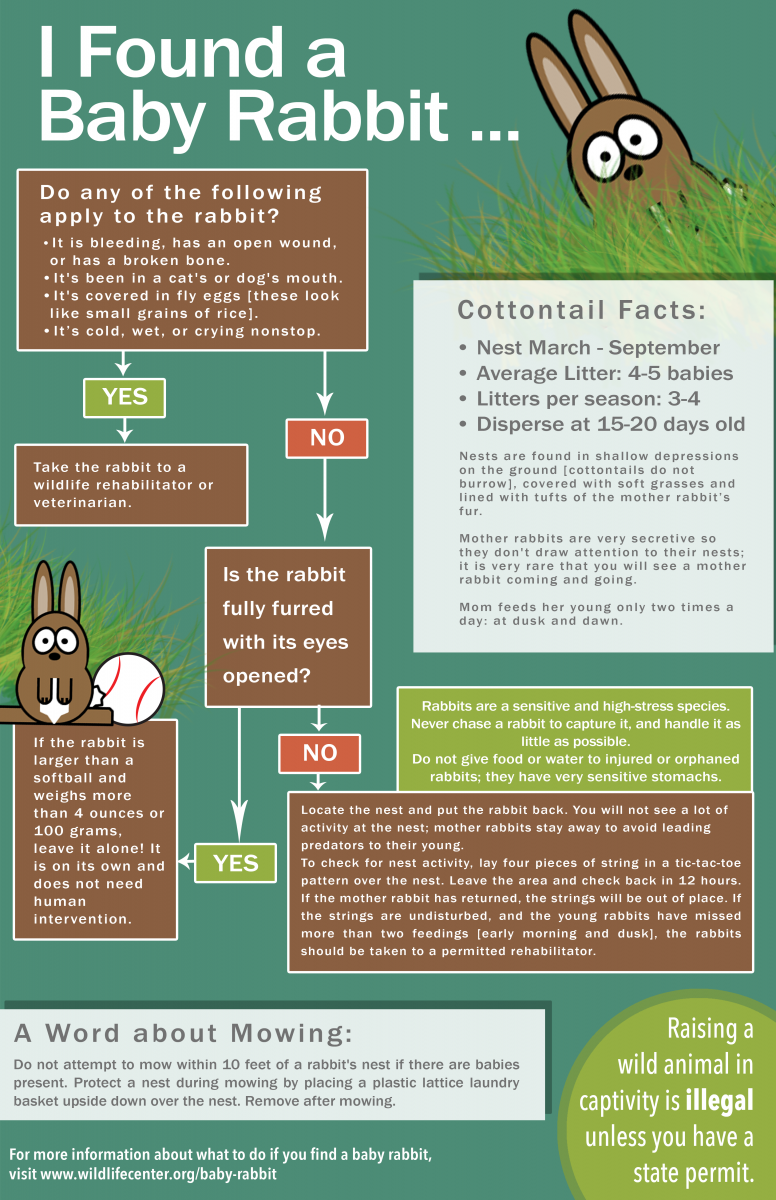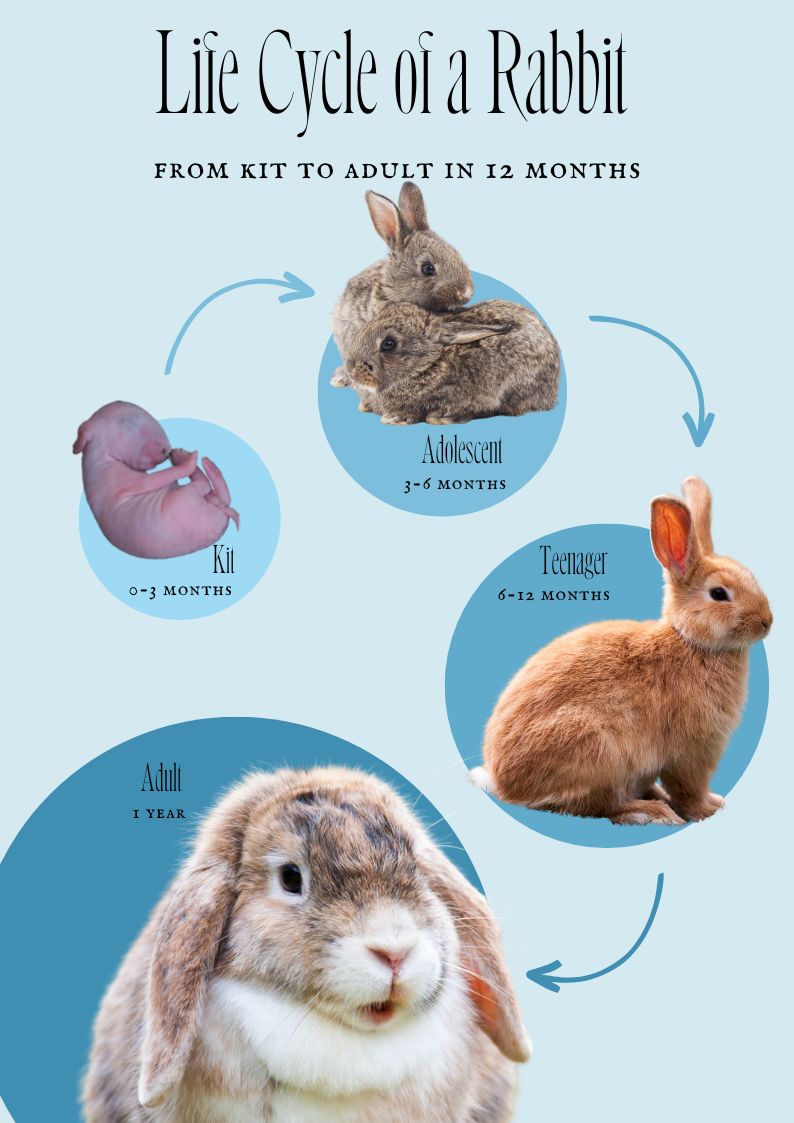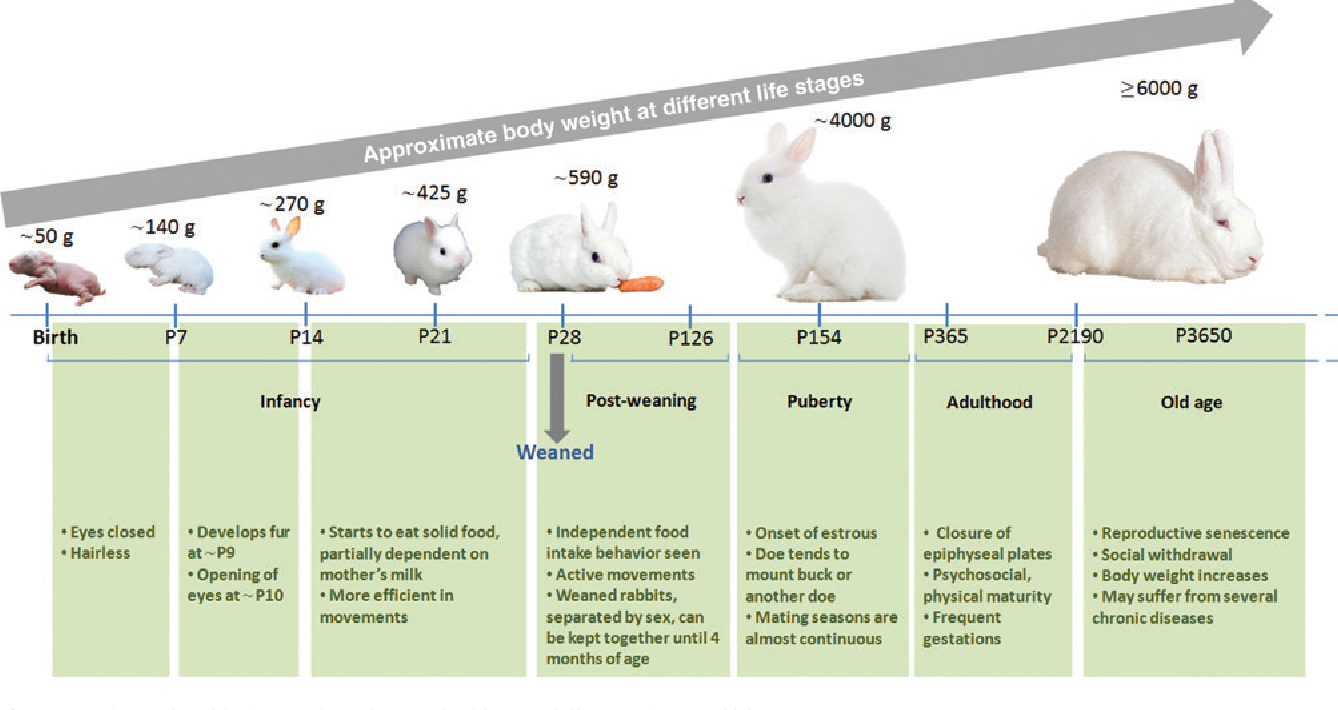Rabbits are one of the cutest and most popular pets, but how do you know how old a rabbit is? Knowing a bunny’s age can help you provide the best care for them. This article will help you learn all about the bunny age stages of rabbits, so you can better understand your pet rabbit.
Baby Bunny Development

What are the Stages of Bunny Growth?
Baby rabbits go through several stages of growth. At birth, they are dependent on their mother and must remain in the nest until they are old enough to venture out on their own. As they grow, they become more independent and active. The stages of growth include: newborns, weanlings, juveniles, and adults.
How Fast Do Baby Rabbits Grow?
Baby rabbits grow rapidly, reaching their adult size in about two months. During this time, they grow an average of 1-2 ounces per week. This growth rate is faster than most other animals, including cats and dogs. As they reach adulthood, their growth rate slows down significantly.
What is a Baby Rabbit Growth Chart?
A baby rabbit growth chart is a useful tool for tracking a rabbit’s progress from birth to adulthood. The chart includes information such as weight, size, and developmental milestones. This information can be used to monitor a rabbit’s health and ensure that it is growing at a normal rate. It can also help owners determine when their rabbit is ready for adoption or breeding.
Stages of Rabbit Growth

Birth to Two Weeks
Newborn rabbits, or kittens, are born blind and deaf. They are completely dependent upon their mother for milk and warmth for the first two weeks of life. During this time, the kittens’ eyes and ears open and they start to explore their environment.
Two to Eight Weeks
At two weeks of age, baby rabbits start to eat solid foods, such as hay and a baby rabbit growth chart is important to monitor their development. During this period, they grow rapidly and start to explore their environment more.
Eight Weeks to Six Months
At eight weeks of age, the baby rabbits are weaned and must rely upon the food they eat to sustain them. They become more independent and active during this period.
Six Months to One Year
When a rabbit is six months to one year old, they are considered juveniles. This is a time of rapid growth and development as they become sexually mature and ready to breed.
Adult
At one year old, a rabbit is considered an adult. They reach their full size and are able to breed. This is the stage of life where a rabbit can live a long and healthy life, with proper care and nutrition.
Stages of Baby Bunnies
Birth to Two Weeks
When newborn baby bunnies are born, they are blind and deaf, and completely dependent on their mother. During this stage, they grow rapidly, and the fur begins to come in. After two weeks, their eyes and ears open and they begin to explore the world.
Two to Eight Weeks
During this stage of baby bunny growth, their fur continues to grow and their bodies become more developed. They begin to learn basic survival skills, such as foraging for food, and navigating the world around them. By eight weeks, they are able to fend for themselves, but still rely on their mother for protection.
Eight Weeks to Six Months
At this stage, baby bunnies continue to develop and grow. They start to explore further away from their nests, and learn more advanced survival skills. At six months, they are fully grown and no longer dependent on their mother.
Six Months to One Year
At this stage, baby bunnies are now adults. They are fully independent, and are able to find their own food and shelter. They can also reproduce and start their own families. This marks the end of their baby bunny growth.
Frequently Asked Questions
What age is considered to be the senior age for a rabbit?
Rabbits reach senior age at 5 years old. At this age, rabbits are considered to be seniors and may require special care and attention. An older rabbit should receive regular veterinary check-ups and may need changes to its diet and environment to ensure its continued health and happiness.
- Nutrition: Older rabbits may have difficulty digesting foods that are high in sugar and fat, so they may need to switch to a diet of specifically formulated senior rabbit food.
- Exercise: As rabbits age, they tend to become less active. They may need help getting exercise, such as being taken for short walks daily.
- Housing: Older rabbits may need larger, softer bedding to stay comfortable, and their cages may need to be kept warmer than normal.
- Veterinary Care: Senior rabbits should be taken to the vet at least twice a year for check-ups. More frequent visits may be needed if the rabbit is suffering from any health issues.
Taking the proper steps to care for a senior rabbit will help ensure its health and happiness.
How Often Should I Take My Rabbit to the Vet for Checkups?
It is important to take your rabbit for regular checkups to ensure their health and wellbeing. An annual vet visit is recommended for all rabbits, but certain health issues may require more frequent vet visits. Additionally, if your rabbit reaches the age of six, you should consider switching them to a senior rabbit diet. This can help reduce the risk of obesity and other health issues.
Are there any specific health issues I should be aware of as my rabbit gets older?
Yes. As your rabbit gets older, they can become more prone to certain health conditions, such as:
- Dental Problems – Molar spurs and overgrown teeth can occur as your rabbit ages, requiring regular dental care.
- Arthritis – arthritis is common in older rabbits, and can cause pain and stiffness in the joints.
- Kidney Disease – kidney disease is one of the most common ailments in older rabbits, and can lead to a decreased appetite and weight loss.
- Respiratory Illness – respiratory illnesses are more common in older rabbits, due to their weakened immune systems.
- Cancer – cancer is more common in older rabbits, and can be difficult to diagnose and treat.
- Gastrointestinal Issues – gastrointestinal issues can occur in older rabbits, such as diarrhea and constipation.
It’s important to keep an eye on your rabbit as they age, and to take them to the vet for regular checkups. This will help ensure that any health issues are caught early and treated quickly.
What type of Diet is Best for Aging Rabbits?
Older rabbits require a higher nutrient diet to help them maintain healthy weight, muscle mass, and support their overall health. A diet that is high in fiber and low in fat is the best way to ensure your aging rabbit is getting the proper nutrition they need.
- Provide hay as the bulk of their diet, such as timothy, oat, or meadow hay.
- Include fresh vegetables with a variety of colors for a balanced diet.
- Fruits should be offered in small amounts as treats.
- A handful of fresh pellets is recommended for older rabbits to supplement their diet.
- Limit treats and make sure they are high in fiber and low in fat.
- Provide clean, fresh water daily.
Older rabbits may also require additional supplements to help maintain their health. Consult with your veterinarian to decide what type of supplements are best for your rabbit. It is important to note that older rabbits may need more frequent veterinary visits and increased care.
Is there anything I can do to make sure my rabbit has a long and healthy life?
- Provide Proper Nutrition – A diet of fresh hay, fresh greens and fresh water is essential for a rabbit’s health and longevity. Avoid processed foods and treats, as these can contribute to digestive issues and obesity.
- Provide Regular Exercise – Rabbits need regular exercise to stay healthy and strong. Make sure your rabbit has access to plenty of space to hop around in, and provide stimulating toys to keep them active.
- Keep the Cage Clean – Cleaning the cage regularly is essential for your rabbit’s health. Remove soiled bedding, droppings and any other debris from the cage on a daily basis.
- Visit the Vet – Regular checkups with a veterinarian are important for rabbits. They can help catch any health issues early, and provide advice and treatments to keep your rabbit healthy and happy.
- Provide Mental Stimulation – Mental stimulation is just as important as physical exercise for your rabbit. Provide plenty of toys, tunnels, and hiding places to keep them entertained and engaged.
- Handle with Care – Rabbits have delicate bones and can be easily injured if not handled properly. Always support your rabbit’s weight when lifting, and never pick them up by their ears.
Conclusion
Rabbits are amazing animals and can make great pets. Understanding their age stages is important for providing proper care. With proper care, rabbits can live for up to 10 years. Knowing the bunny age stages will help you provide the best care for your rabbit.
